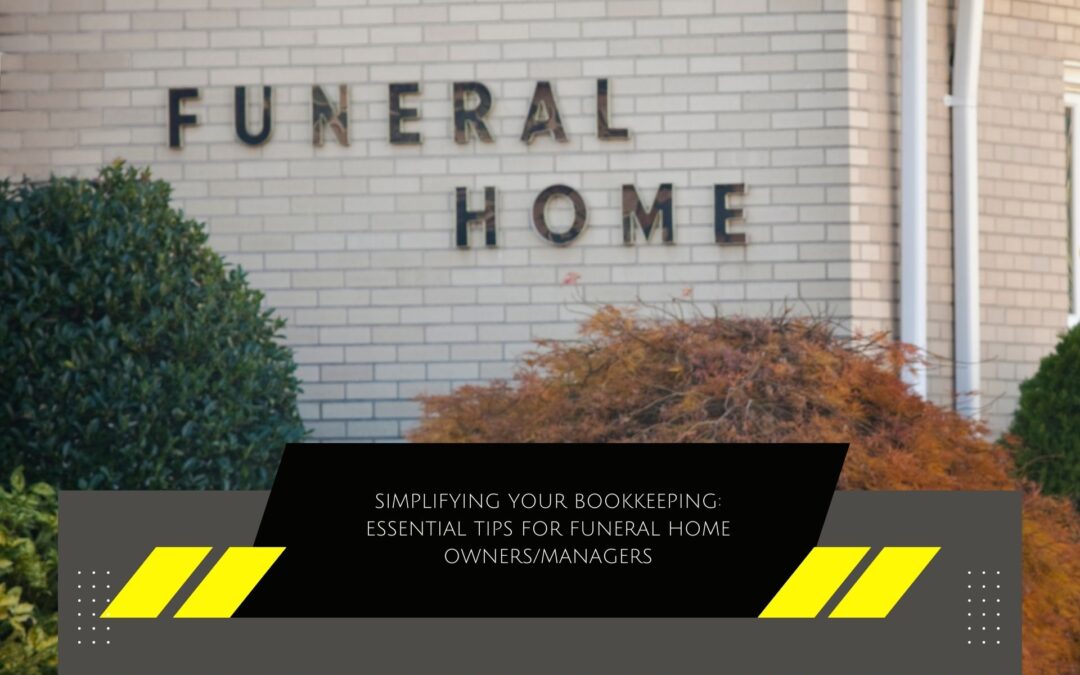Bookkeeping is a critical component of running a successful funeral home. Effective financial management ensures compliance and accuracy and provides valuable insights into the health of your business. Maintaining orderly books can be incredibly challenging in the unique context of funeral home operations, where compassion meets commerce. This article offers practical advice and strategies to simplify bookkeeping for funeral home owners/managers, ranging from basic practices to more advanced tips.
Establish a Dedicated Accounting System
The first step in simplifying bookkeeping is to establish a dedicated accounting system. Whether it’s a software solution like MYOB, XERO, QuickBooks, or a manual ledger system, having a reliable platform helps streamline financial tracking. For funeral homes, where transactions can
Varying widely from one service to another, a robust system can help categorise expenses and revenues efficiently.
Separate Personal and Business Finances
One common mistake small business owners/managers make is mingling personal and business finances. For funeral home owners/managers, this separation is crucial. Not only does it simplify bookkeeping, but it also ensures more transparent financial reporting and easier tax preparation.
Regularly Update Financial Records
Consistency is vital in bookkeeping. Regular updates – daily, weekly, or monthly – prevent backlogs and maintain accuracy. This practice is critical in the funeral industry, where expenses and income fluctuate significantly.
Understand Industry-Specific Tax Obligations
Funeral homes have unique tax considerations, including GST on services and products and specific deductions related to the industry. Understanding these nuances is essential for accurate tax filings and taking advantage of allowable deductions.
Use Technology to Your Advantage
Leveraging technology can significantly ease the bookkeeping process. Cloud-based accounting software offers accessibility and real-time financial tracking. Additionally, many software solutions integrate with other business tools, providing a comprehensive view of your financial health.
Monitor Cash Flow Closely
For funeral homes, managing cash flow is vital. This includes keeping track of outstanding invoices and ensuring expenses are paid on time. Regular cash flow analysis helps make informed decisions about investments and operational costs.
Plan for Major Expenses
Funeral homes often face major expenses like vehicle purchases or facility renovations. Planning these expenditures ensures they don’t disrupt your financial stability. Setting aside funds regularly can mitigate the impact of these significant expenses.
Seek Professional Help When Needed
Bookkeeping can be complex, and there’s no shame in seeking professional help. A qualified bookkeeper can provide:
- Invaluable assistance in managing your books.
- Offering advice tailored to your industry.
- Ensuring compliance with financial regulations.
Reach Out to Katia Chehade for Expert Bookkeeping Assistance
For funeral homeowners/managers looking to simplify their bookkeeping process, reaching out to a bookkeeping expert like Katia Chehade can be a game-changer. Katia brings a wealth of experience and a deep understanding of the unique challenges faced by the funeral industry. Whether you need help setting up an accounting system, navigating tax obligations, or managing your cash flow, Katia can offer tailored solutions to streamline your financial processes.

